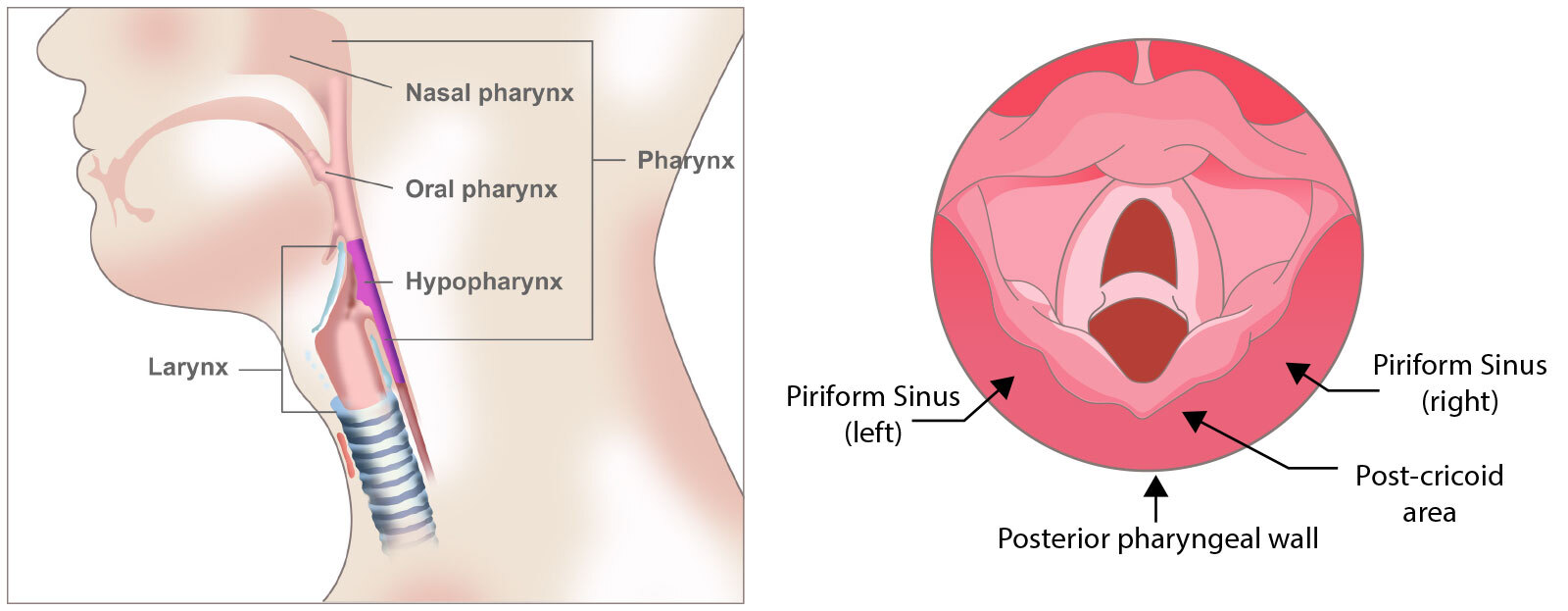Important Traffic Notice: Due to road construction on Southwest Highway directly in front of our Chicago Ridge location, traffic may be heavier than usual. Please plan ahead and allow extra time to arrive safely. Thank you for your patience and understanding!
Hypopharyngeal cancer is a disease in which malignant (cancer) cells form in the tissues of the hypopharynx— the bottom part of the pharynx (throat). This type of cancer is considered to be a type of head and neck cancer.
The pharynx is a hollow tube about 5 inches long that leads from the oral and nasal cavities in the head to the esophagus (the tube that goes from the throat to the stomach) and larynx (voice box). The pharynx serves a purpose in both the respiratory and digestive processes.
The hypopharynx is divided into three regions: the posterior pharyngeal wall, the piriform sinuses, and the postcricoid region. Cancer may be found in one or more of these areas.
Most hypopharyngeal cancers form in squamous cells, the thin, flat cells lining the inside of the hypopharynx.

Hypopharyngeal Cancer Risk Factors
A risk factor is anything that increases your risk of getting a disease. Risk factors of hypopharyngeal cancer include:
- Smoking and/or chewing tobacco
- Frequent or heavy alcohol consumption
- Poor nutrition
- Human papillomavirus (HPV) infection
- Genetic syndromes or inherited gene mutations
- Exposures to certain fumes and chemicals in the workplace
- Gender: more common in men compared to women
- Age: people over the age of 55 are at higher risk of developing cancer of the hypopharynx
- Race: more common among African Americans and Caucasians
- Gastroesophageal reflux disease (GERD)
- Having Plummer-Vinson syndrome. This is a disorder that involves iron deficiency and causes difficulty swallowing.
It’s important to remember that having a risk factor, or even several of them, does not mean that you will get hypopharyngeal cancer. Likewise, many people who do get the disease may have few or no known risk factors at all.
Signs and Symptoms of Hypopharynx Cancer
People with hypopharyngeal cancer may experience the following signs and symptoms. Keep in mind, however, that these can also be related to something other than cancer. See your doctor if you have the following:
- A sore throat that does not go away
- Ear pain
- A lump in the neck
- Pain or difficulty when swallowing
- Constant, persistent coughing
- A change in voice
- Chronic bad breath
- Difficulty breathing
Again, these could be symptomatic of a different condition. With that said, if any of these symptoms lasts for more than three weeks, it’s a good idea to schedule an appointment with your doctor to be checked. If it is cancer, early detection can give you better treatment results.
Learn how cancer of the hypopharynx is detected and diagnosed.

Hypopharyngeal Cancer Treatment in the South Chicago Suburbs
If you have received a cancer diagnosis and seek hypopharyngeal cancer treatment in the South Chicago suburbs, our cancer centers offer the latest treatment options. We also provide second opinions. Our head and neck cancer doctors are located throughout the South Chicago suburbs, including Chicago Ridge, Mokena, Hazel Crest, Palos Heights, and Oak Lawn.